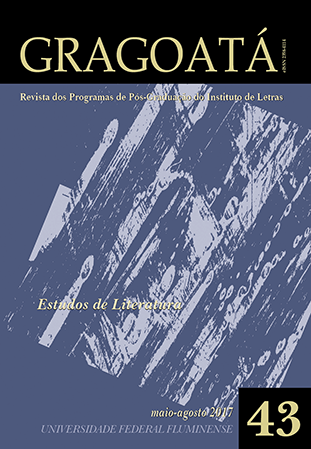Pride and Prejudice and Zombies: um corpo (textual) zumbificado
DOI:
https://doi.org/10.22409/gragoata.v22i43.33504Palavras-chave:
Mashup literário, . Zumbi. procedimentos de hibridação.Resumo
Ao final da primeira década do novo milênio, o mercado editorial assistiu à ascensão de uma nova forma de composição textual, o mashup literário, produzido através de movimentos de leitura e escritura que potencializam a noção barthesiana do texto como “tecido de citações”. Para tanto, o mashup se baseia em procedimentos de fragmentação de uma obra clássica para nela enxertar elementos caros à cultura pop hodierna. Pride and Prejudice and Zombies, de Jane Austen e Seth Grahame-Smith, foi o precursor dessa tendência, abrindo caminho para um novo filão na indústria de best-sellers produzidos segundo os mesmos procedimentos. Diante de tal contexto, o presente artigo analisa a obra Pride and Prejudice and Zombies a fim de entender, em termos de imanência, os procedimentos pelos quais, nas entranhas do romance, fundiu-se a escrita oitocentista de Austen com a contemporânea de Grahame-Smith, formando uma híbrida obra, também ela zumbi, dado que habita um entre-lugar entre a escrita de uma autora morta e de um autor vivo. Desse modo, adotando a imagem do zumbi não só como elemento acrescido ao enredo, mas como processo de escrita e adaptação – pela zumbificação do romance de Jane Austen –, objetivamos analisar as entranhas de Pride and Prejudice and Zombies, partindo do conceito de mashup literário, gênero que ensejou a mistura entre diferentes textos na obra, por meio de procedimentos de hibridização.
---
DOI: http://dx.doi.org/10.22409/gragoata.2017n43a762.
Downloads
Downloads
Publicado
Edição
Seção
Licença
AUTORIZAÇÃO
Autores que publicam em Gragoatá concordam com os seguintes termos:
Os autores mantêm os direitos e cedem à revista o direito à primeira publicação, simultaneamente submetido a uma licença Creative Commons Atribuição 4.0 Internacional (CC BY 4.0), que permite o compartilhamento por terceiros com a devida menção ao autor e à primeira publicação pela Gragoatá.
Os autores podem entrar em acordos contratuais adicionais e separados para a distribuição não exclusiva da versão publicada da obra (por exemplo, postá-la em um repositório institucional ou publicá-la em um livro), com o reconhecimento de sua publicação inicial na Gragoatá.
A Gragoatá utiliza uma Licença Creative Commons - Atribuição CC BY 4.0 Internacional.











